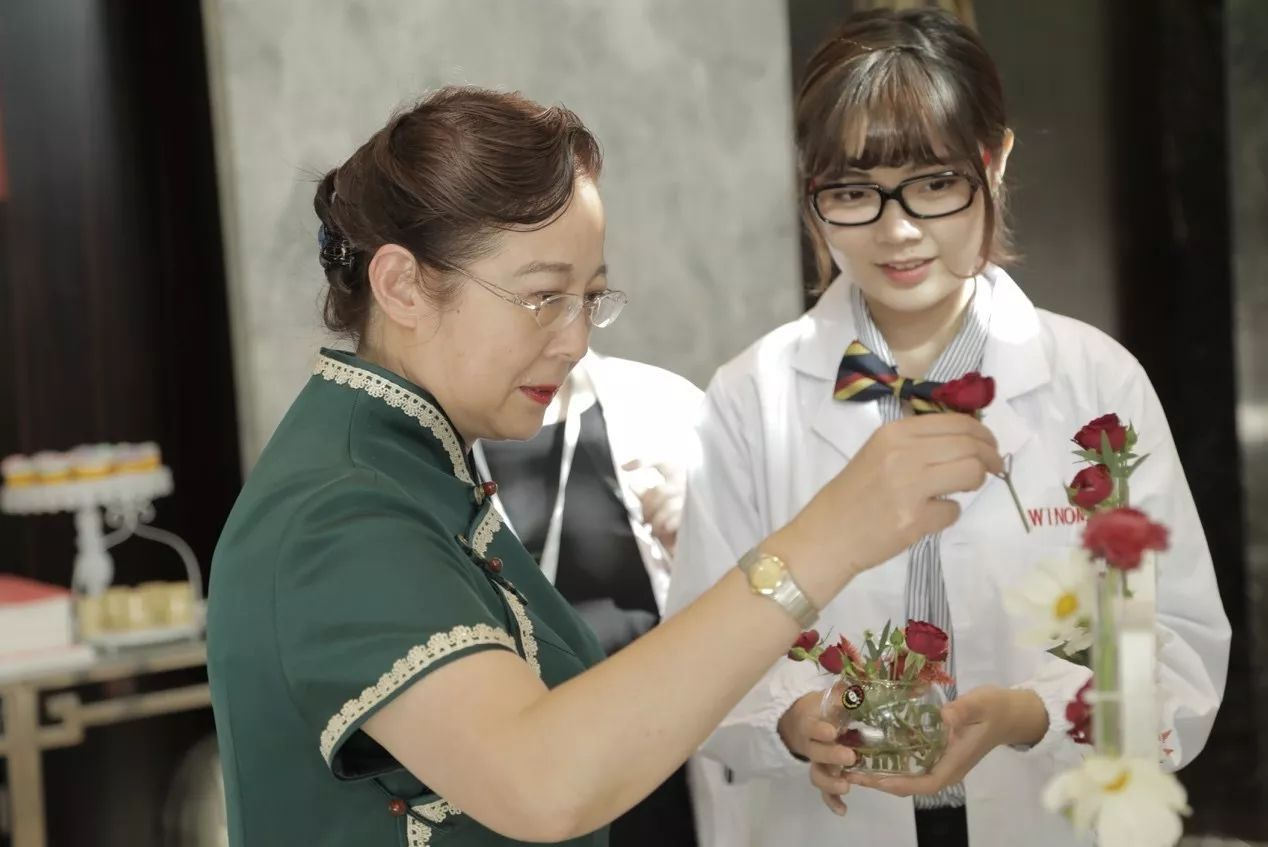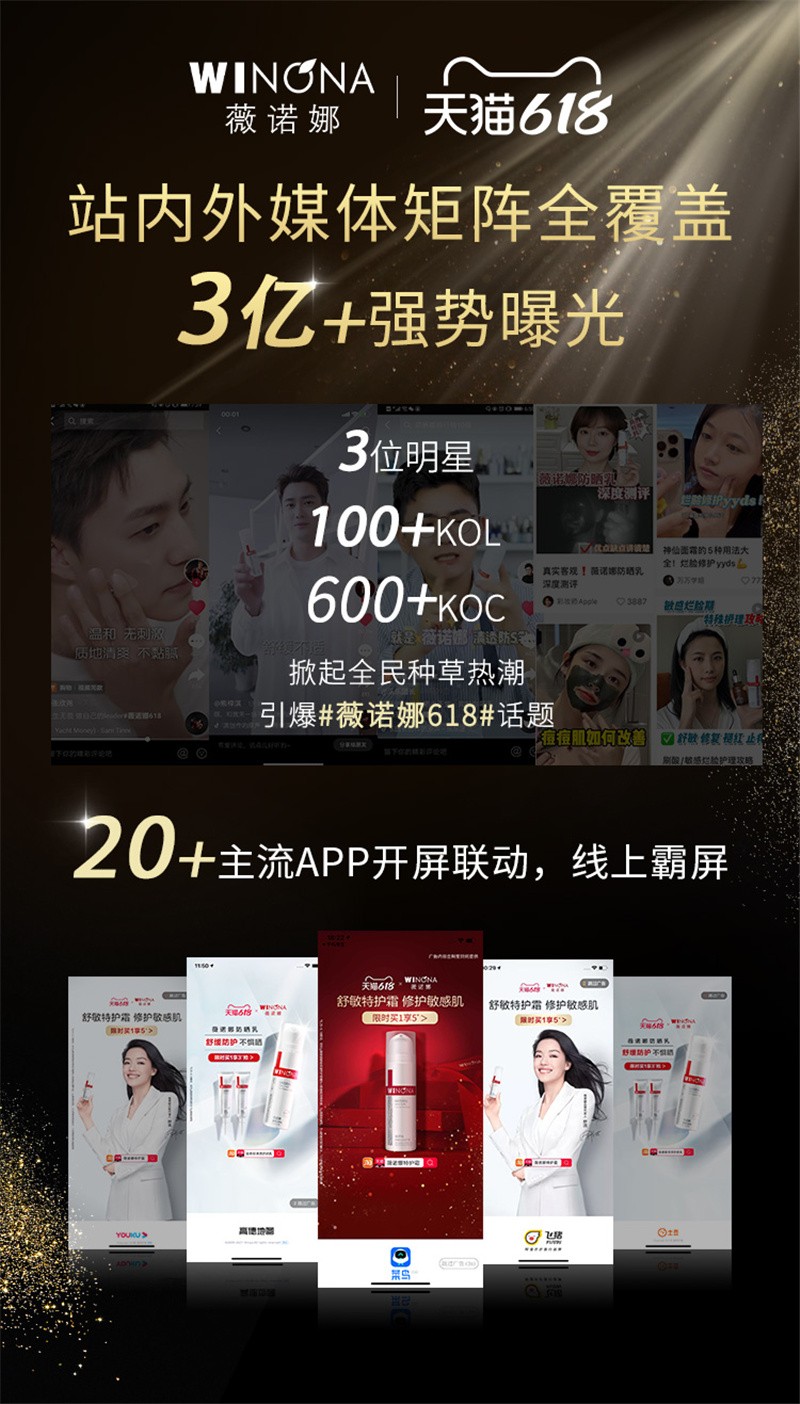In the past 618 shopping festival 2021, Winona became the only domestic skincare brand on the TOP10 best-selling skincare brand list.1 The same situation happened at last year’s Double 11 shopping festival. When international brands (Estee Lauder, L’Oreal, Lancome, etc.) still dominate the Chinese skincare market, and traditional domestic brands (Pechion, Proya, etc.) seem to fall behind, Winona stands out. Winona’s parent company, Botanee (BTN), successfully launched an IPO on March 23, 2021. Its stock price rose by 272.09% on the first day, making it the largest cosmetics company in China by market value.2 Its latest annual report shows that BOTANEE’s revenue in 2020 reached 2.636 billion yuan, increasing by 35.64%. 3

Botanee launched an IPO
Start
Unlike most emerging domestic brands founded in recent years, Winona has a long history. It was founded in 2008 by DIHON Pharmaceutical, one of the biggest pharmaceutical companies in China. Because DIHON had a close relationship with hospitals and famous doctors, Winona’s research got professional support. It completed clinically observation in the dermatology department of 16 well-known Chinese hospitals at the initial research stage. In November 2008, Winona was officially launched at the Annual Meeting of Chinese Dermatologists hosted by the Dermatologist Branch of the Chinese Doctor Association, becoming China’s first functional skincare product that passed through clinical observation. Though Winona has such a solid medical background, it didn’t gain much traction and even lost money in its first years. In that period, its primary distribution channels were hospitals, clinics, and OTC (Over-The-Counter) drug stores. Winona itself, as a niche skincare product, was only known by some people with sensitive skin problems. However, this history helps Winona built a good consumer-trust foundation.
In 2011, DIHON sold Winona to Botanee before DIHON itself was acquired by BAYER. Winona has walked to a bigger market since then.

Professor He Li (Left), Winona Chief Expert, Dean of Yunnan Dermatology Hospital, The First Affiliated Hospital of Kunming Medical University
Development
In 2013, Winona officially opened its Tmall store. After achieving 18 million yuan online sales in the first year, it expanded more online channels in the following years, including JD.com, VIP.com, and WeChat mini-program. 2 However, Tmall is always its main online channel, accounting for over 50% of online sales.2 During this process, Winona also organized its own data department to build its database for consumer analysis and advertising investment & supply chain management.
Afterwards, Winona promoted its research cooperation with dermatologists further. In September 2017, Winona and 19 top dermatologists jointly released a red book named "Winona Medical Skincare Products and Their Clinical Application," containing 11 national guidelines and 64 basic research and clinical application essays. In 2020, the title of the Red Book was updated to "Clinical Application of Winona's Functional Skincare Products", which included 128 academic papers on Winona's functional skincare products published in China and abroad. 63 top dermatologists contributed in writing and editing this red book. All of them are chief dermatologists and professors from famous hospitals across China.
In the 2010s, functional skincare/ cosmeceutical, these two terms weren’t widely accepted by the public. Therefore, as a functional skincare/ cosmeceutical brand focusing on sensitive skin, Winona also made a great effort on consumer education. It opened an online column named “1V1 Dermatologist Clinic”, in which Winona invited a dermatologist to answer consumers’ questions about skincare. Consumers can take part in this activity through its official WeChat account and Weibo account. As for offline campaigns, Winona organized a series of activities named “525 National Skincare Day” every year since 2013. In May 28 - June 10 2020, Winona entered 25 universities in ten cities to celebrate 525 National Skincare Day, including giving public speeches and providing face-to-face consultation services for consumers.

Winona’s offline consulting service
Explosive Growth
As functional skincare gained more and more attention in recent years, Winona finally witnessed its explosive growth because of its strong medical background and good reputation. Especially in 2020, the year of the outbreak of COVID-19, functional skincare gained unprecedented attention because of people’s rising focus on health and various skin problems caused by wearing facial masks. Grabbing this opportunity, Winona became the ace brand in the market. In 2020 Double 11 shopping festival, its sales on Tmall exceeded 700 million yuan, increasing 105% YoY.4
However, Winona faced a huge challenge when it expanded its business from pharmacies and hospitals to e-commerce. The pharmacy and hospital channels are more like a to-B business since doctors play a decisive role in patients’ buying decisions, but the brand needs to face its consumers in e-commerce channel directly. Shifting from to-B business to to-C business, Winona still showed excellent performance in to C marketing compared with other skincare brands that are also mainly distributed in pharmacies. It is the pioneer inviting professional KOLs (key opinion leader), such as dermatologists and Ph. D in medicine, to recommend their products online. It also skillfully applied other marketing strategies, such as spokespersons, live-streaming marketing, IP crossover cooperation, ads on social media, etc., to cover Omni-platforms, including Weibo, WeChat, Douyin, Little Red Book, and Bilibili. During this year’s 618 shopping festival, Winona cooperated with 3 celebrities, over 100 KOLs, and over 600 KOCs (key opinion consumers), which contributed to over 300 million online exposure.5 It joined Austin Li’s live streaming and cooperated with Tmall to limitedly launch 20,000 Tmall Fantastic Gift Boxes. Its Tmall store even held live-streaming for 24 hours every day during the festival. On Douyin, besides its founder joined the self-run live-streaming, it also invited various celebrities, KOLs, even consumers to join the party, making the topic #Winona618 gain 170 million exposure.5

Future
After expanding its offline channels by entering cosmetic retail stores such as Watson, Winona plans to expand more product lines in the next years, including functional makeup, male care, and children care products. Children care products will be the priority.
Some people say that Winona is the “Perfect Diary” in the Chinese skincare market. In terms of speed, Winona can’t compete with Perfect Diary. The former took 12 years to grow from 0 to 2 billion yuan in sales, while the latter took only five years to increase from 0 to 5 billion yuan in sales. However, Winona’s profit is much higher than Perfect Diary’s. In 2020, Winona’s profit reached 500 million yuan while Perfect Diary lost 2.7 billion yuan in the same period. Besides, Botanee’s (Winona’s parent company) market value already exceeded Yatsen Global’s (Perfect Diary’s parent company). Why does the capital market think higher of Winona’s parent company? One of the important reasons is that Perfect Diary is a popular makeup brand relied on huge marketing cost, but its products have less competitive advantages. On the contrary, Winona’s products are backed up by solid scientific and patented technology. Also, 12-year experience in hospitals and pharmacies enables this brand to gain consumers’ trust and loyalty through word-of-mouth recommendations. Winona is not “Perfect Diary” in the Chinese skincare market. This unique brand has its own advantages.













